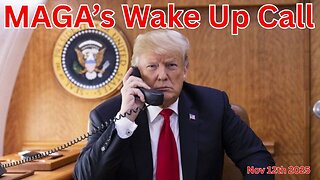Premium Only Content

Fergus Hodgson on the trade war between the US and China for dominance in Latin America
US-China Trade War in Latin America: Is Washington Finally Waking Up?
For decades, Latin America was seen as the natural sphere of influence for the United States—not just due to geography, but because of deep historical, diplomatic, and commercial ties that anchored the region to the Western hemisphere. Yet over the past twenty years, a silent but strategic threat has been gaining ground with surgical precision: Communist China.
China's presence in Latin America is no longer hypothetical. It is a strategic reality. From port infrastructure in Argentina to telecommunications in Mexico, and from conditional lending to opaque diplomacy, the Chinese Communist Party (CCP) has methodically worked to erode American influence. Perhaps most troubling is China’s deepening grip on the Panama Canal—a geopolitical artery essential to U.S. maritime strength.
According to analyst Fergus Hodgson, this shift has gone dangerously under the radar, ignored by a U.S. political class distracted by foreign wars and internal ideological battles. But there are signs of a long-overdue awakening.
One such sign is Senator Marco Rubio’s recent visit to Mexico, where he addressed the growing presence of Chinese, Russian, and even Iranian influence in the region. Rubio’s visit sent a loud message: the United States is prepared to sanction or outright block foreign companies doing business with geopolitical rivals—if that business undermines American security.
However, Hodgson is clear: while the “stick” approach of sanctions is necessary, it must be matched by the “carrot” of opportunity. Economic incentives like updated trade agreements and nearshoring initiatives can help countries like El Salvador, Guatemala, and Honduras pivot away from authoritarian temptations. These nations still share a cultural and historical alignment with the U.S.—one that can be revived with the right policies.
Nowhere is the challenge more urgent than in Panama. China’s stake in critical parts of the Panama Canal is not just a commercial issue—it is a national security threat. With nearly 6% of global maritime trade passing through the canal, Chinese control could limit America’s ability to project naval power and respond to global crises. It's not just about trade—it’s about strategic dominance.
The trade war, then, has evolved beyond tariffs and spreadsheets. It’s an existential clash over the future of the Western Hemisphere. Latin America stands at a crossroads between two visions: the American model of economic freedom and transparency, and the Chinese model of autocracy and manipulation.
It is imperative that the United States act swiftly and assertively. Lip service at the OAS is no longer enough. A full-spectrum strategy—economic, diplomatic, and security-based—is essential to regaining lost ground and protecting America’s backyard.
The key question remains: will this administration rise to the challenge, or will it allow a communist regime to fill the vacuum left by decades of American inaction?
#TradeWar #ChinaInLatinAmerica #PanamaCanal #MarcoRubio #Nearshoring #CCPInfluence #HemisphericSecurity #USForeignPolicy #LatinAmerica #WakeUpCall
-
 1:25
1:25
Gateway Hispanic
2 hours agoTrans man says he is excited to read the Quran
8 -
 LIVE
LIVE
The Mel K Show
1 hour agoMORNINGS WITH MEL K - Dueling Narratives & Endless Distraction: Don’t Lose Focus! - 11-12-25
600 watching -
 LIVE
LIVE
The Shannon Joy Show
1 hour agoH1-B-Trayal! How Many Times Does Trump Have To Punch MAGA In The Face Before They Realize He’s Just Not That Into Them?
102 watching -
 1:56:53
1:56:53
Badlands Media
10 hours agoBadlands Daily: November 12, 2025
66.3K5 -
 43:54
43:54
VINCE
2 hours agoThomas Speciale: The Man Behind John Brennan's Meltdown | Episode 167 - 11/12/25 VINCE
42.8K102 -
 LIVE
LIVE
Nikko Ortiz
2 hours agoMILITARY FAILS AND KAREN ACTIVITIES... |Rumble Live
234 watching -
 2:59:36
2:59:36
Wendy Bell Radio
7 hours agoMAGA's Wake Up Call
41.8K85 -
 22:16
22:16
iCkEdMeL
1 hour ago $1.07 earnedBREAKING: Road Rage Shooting Reported on San Antonio’s East Side | LIVE Scene
4.4K1 -
 1:16:23
1:16:23
Graham Allen
3 hours agoThe United States of Islam?! We Are Being INVADED!!! + ANTIFA Must End NOW!!
148K1.56K -
 LIVE
LIVE
Viss
2 hours ago🔴LIVE - ARC RAIDERS Befriend or Betray? Chat Decides!
149 watching